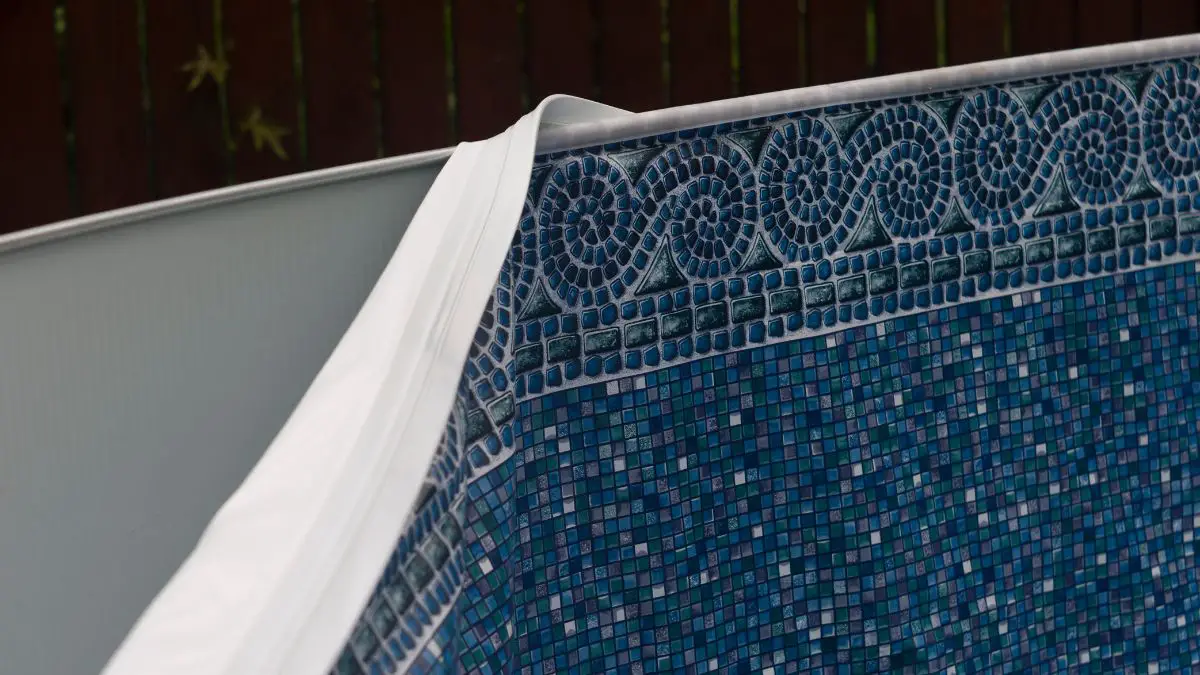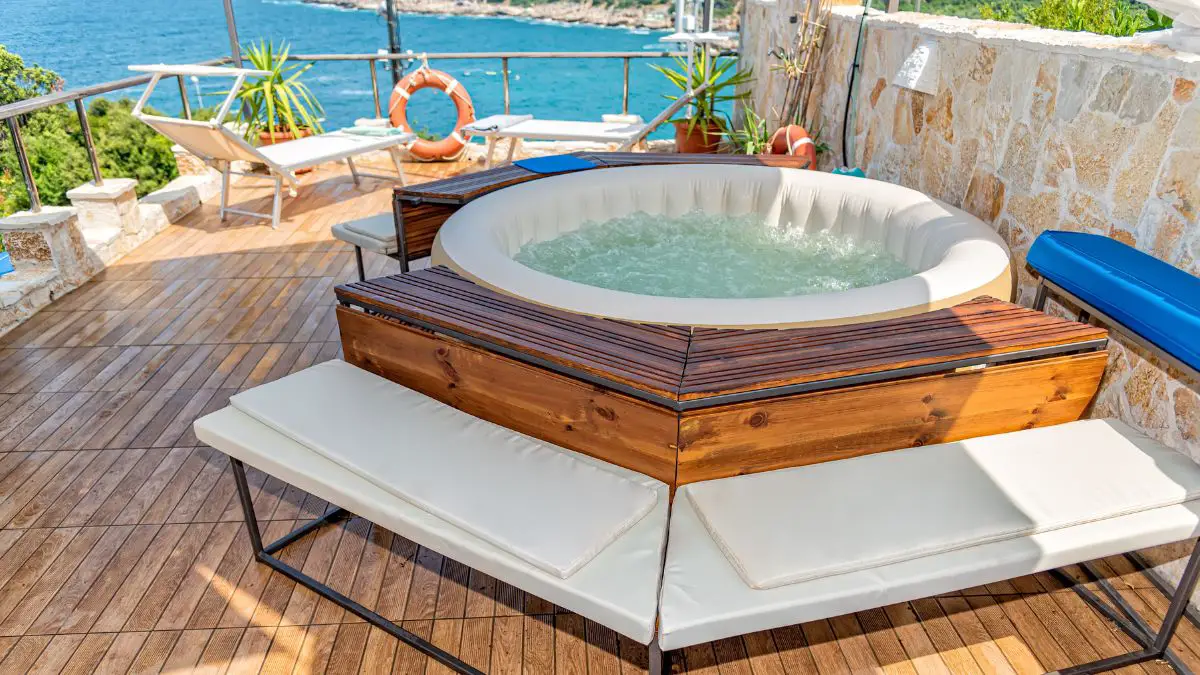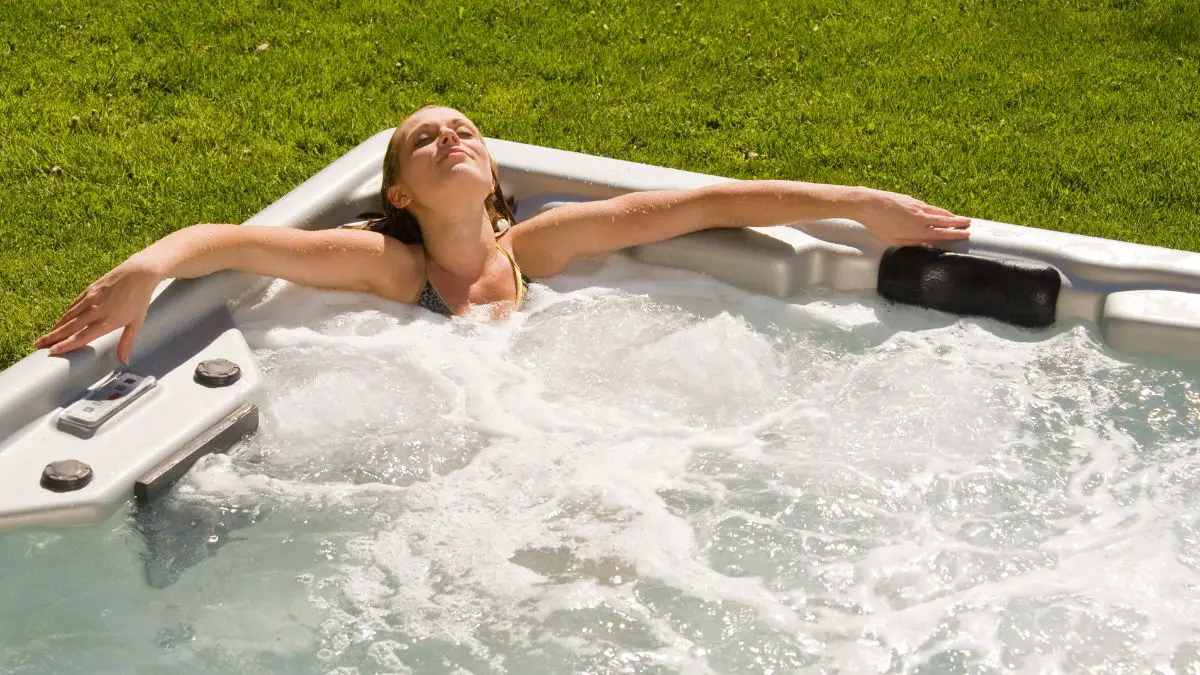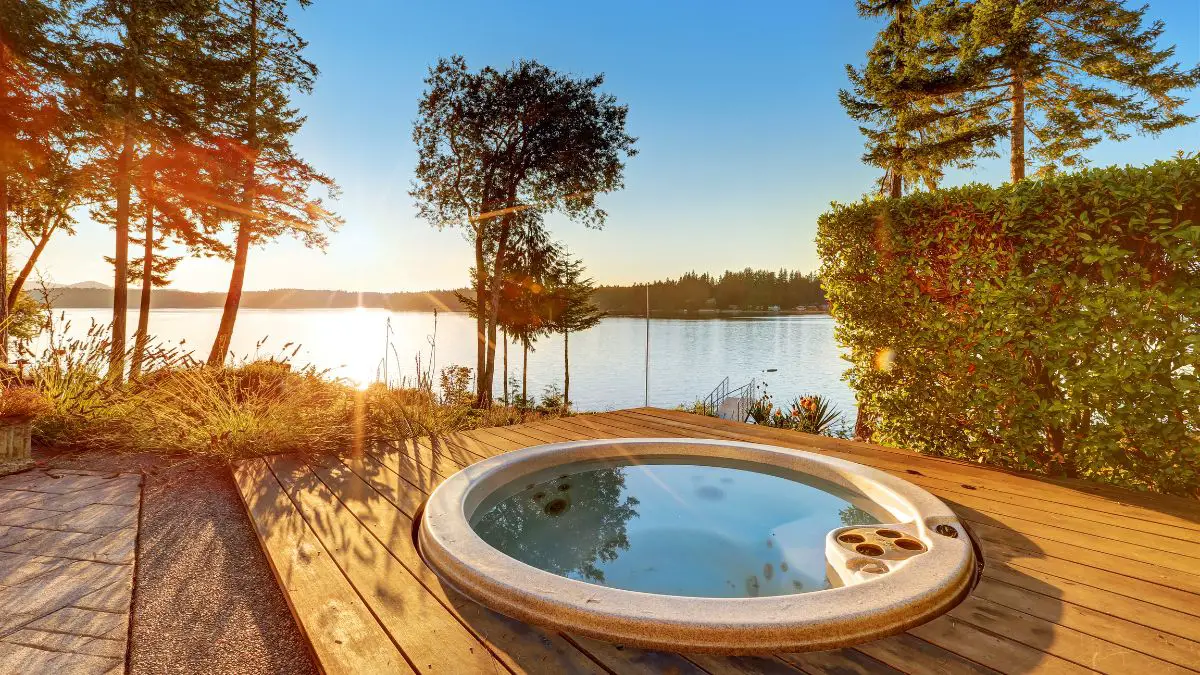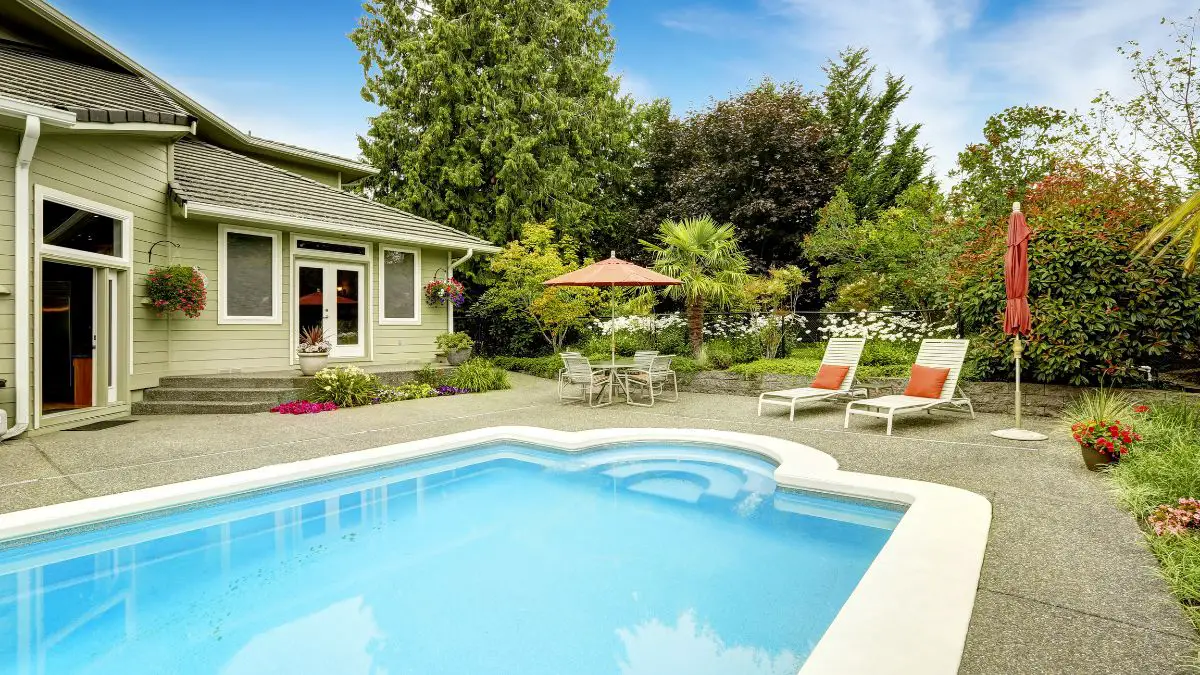The lifespan of a pool liner varies significantly depending on the type of pool you have: vinyl, fiberglass, or concrete. Each material’s expected durability and maintenance requirements can influence its longevity.
Vinyl pool liners typically last 5 to 9 years for inground pools and 6 to 10 years for above-ground pools. However, with proper maintenance, the lifespan of a vinyl liner can be extended up to 15 years.
Factors such as the quality of the vinyl, maintenance, and climate can affect the longevity of a vinyl pool liner. It’s important to note that while liner warranties may last 25 to 30 years, they are usually prorated, meaning their value decreases over time.
In contrast, fiberglass pools are known for their durability, with a lifespan exceeding 30 years. High-quality fiberglass pools can last over 50 years if properly installed by a reputable manufacturer.
The gel coat surface of fiberglass pools is durable and resistant to wear, contributing to their long lifespan. Maintenance is relatively easy compared to vinyl and concrete pools, and they do not require liner replacement.
Concrete pools have a significantly longer potential lifespan, with well-constructed pools lasting up to 70 years. However, a concrete pool’s interior finish does not last as long and must be resurfaced every 10 to 15 years.
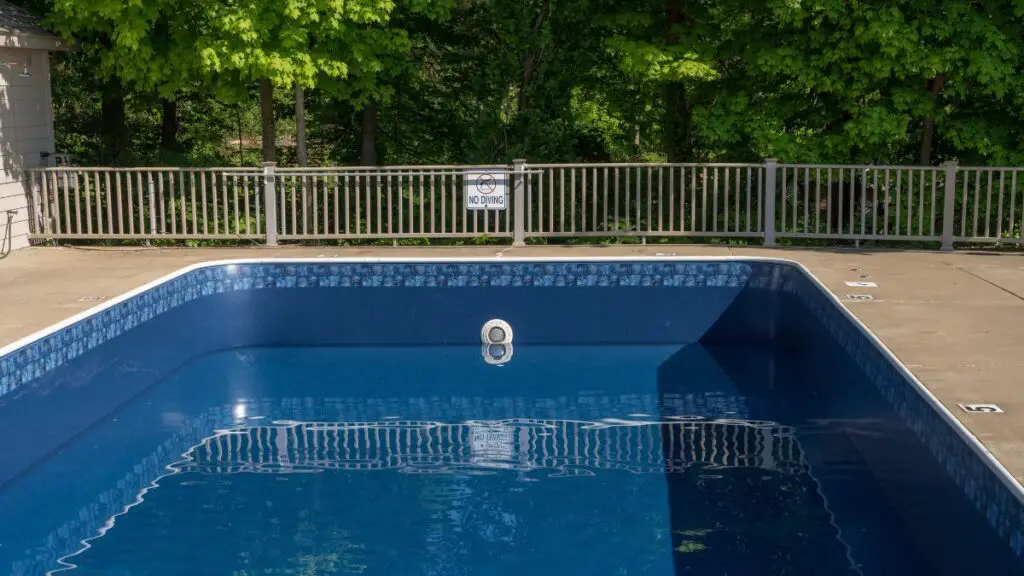
What is a Pool Liner?
You first notice the clear, inviting water when you gaze into your pool. But beneath that sparkling surface lies an unsung hero: your pool liner. This essential component of your pool serves a vital purpose, acting as a barrier between the pool structure and the water.
A pool liner is more than just a functional element; it’s also an aesthetic feature. Available in various colors and patterns, it adds a touch of personality to your pool. But don’t let its good looks fool you. The pool liner is a workhorse, protecting your pool from leaks and helping to maintain the shape of the pool.
Types of Pool Liners
When it comes to pool liners, you have popular options. The type of liner you choose can depend on several factors, including your pool type, budget, and personal preference. Let’s dive into the different types of pool liners:
- Vinyl Pool Liners: These are the most common type of pool liners. Vinyl pool liners are popular due to their affordability and flexibility. They’re easy to install and come in various designs and colors. However, while durable, they may not last as long as other liners. The average life of a vinyl pool liner is around 6-12 years, depending on factors like maintenance and usage.
- Concrete Pool Liners: Concrete liners are typically used in inground pools. They’re incredibly durable and can be customized to any shape or size. However, they require more maintenance than vinyl liners and can be more expensive to install and repair.
- Fiberglass Pool Liners: Fiberglass liners are popular for their durability and low maintenance. They’re resistant to algae growth and require fewer chemicals. However, they can be more expensive than vinyl liners and have fewer design options.
- Tile Pool Liners: Tile liners offer a luxurious look and feel. They’re durable and long-lasting, but they require more maintenance and can be costly to install and have costly repair.
Factors Affecting the Lifespan of a Pool Liner
Understanding the lifespan of your swimming pool liner is crucial, but it’s equally important to know what factors can influence it. Several elements can impact how long a pool liner lasts, and being aware of them can help you take steps to extend your liner’s life. Let’s dive into these factors:
Quality of the Liner
The quality of your swimming pool liner plays a significant role in its lifespan. High-quality liners are typically more durable and resistant to damage. They’re designed to withstand the rigors of pool usage and weather conditions.
When selecting a liner, consider its thickness and material. For instance, a vinyl pool liner’s longevity can vary based on its quality. It’s worth investing in a high-quality liner upfront to save on potential replacement costs.
Pool Usage
How often and how you use your pool can also affect your pool liner’s lifespan. Frequent use, especially if it involves rough play or sharp objects, can lead to wear and tear on your liner.
Chemicals used in the pool, such as chlorine, can also affect the liner. For instance, a saltwater pool liner may have a different lifespan than a chlorine pool liner due to the different chemicals used.
Weather Conditions
Mother Nature can significantly impact your swimming pool liner’s lifespan. Exposure to harsh sunlight can cause your liner to fade over time.
Extreme hot and cold temperatures can also affect the liner’s durability. For example, freezing and thawing cycles in colder climates can cause the liner to expand and contract, potentially leading to damage.
Maintenance and Care
Proper maintenance and care are key to extending your pool liner’s life. This includes regular cleaning, balancing your pool’s chemistry, and promptly addressing any signs of damage. Regular pool maintenance can help prevent liner fading, wrinkles, and leaks.
How often you replace your pool liner can depend on these factors. By choosing a high-quality liner, using your pool responsibly, protecting it from harsh weather conditions, and maintaining it properly, you can help ensure your pool liner lasts as long as possible.
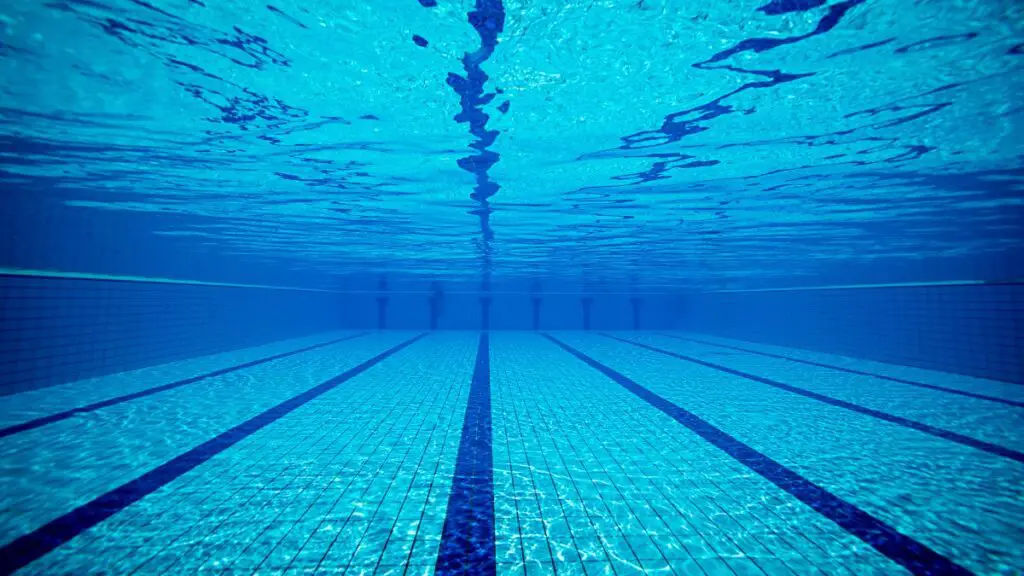
Average Lifespan of Pool Liners
When it comes to the lifespan of pool liners, there’s no one-size-fits-all answer. The longevity of your pool liner can depend on several factors, including the type of pool you have. Let’s look at the average lifespan of both inground and above-ground pool liners.
Lifespan of Inground Pool Liners
Inground pools are popular for many homeowners, offering a permanent and aesthetically pleasing addition to their outdoor space. But how long does a liner pool last when it’s inground?
Inground pool liners, particularly vinyl ones, typically last 5 to 12 years. However, this can vary based on factors like the quality of the liner, the pool’s usage, and how well the pool is maintained. High-quality liners that are well cared for can sometimes last up to 15 years.
It’s also worth noting that the pool’s design can influence an inground pool liner’s lifespan. For instance, swimming pools with more corners or unusual shapes may experience more wear and tear on the liner, potentially reducing lifespan.
Lifespan of Above-Ground Pool Liners
Above-ground pools offer a more affordable and flexible option for those looking to enjoy the benefits of a pool without the commitment of an inground pool. But how long does an above-ground pool liner last?
On average, above-ground pool liners tend to last between 6 to 10 years. Like inground pool liners, this can vary based on several factors, including the quality of the liner, pool usage, and maintenance.
One advantage of above-ground pools is that their liners are typically easier and less expensive to replace than inground pool liners. So, while they may not last as long, the replacement process can be less hassle.
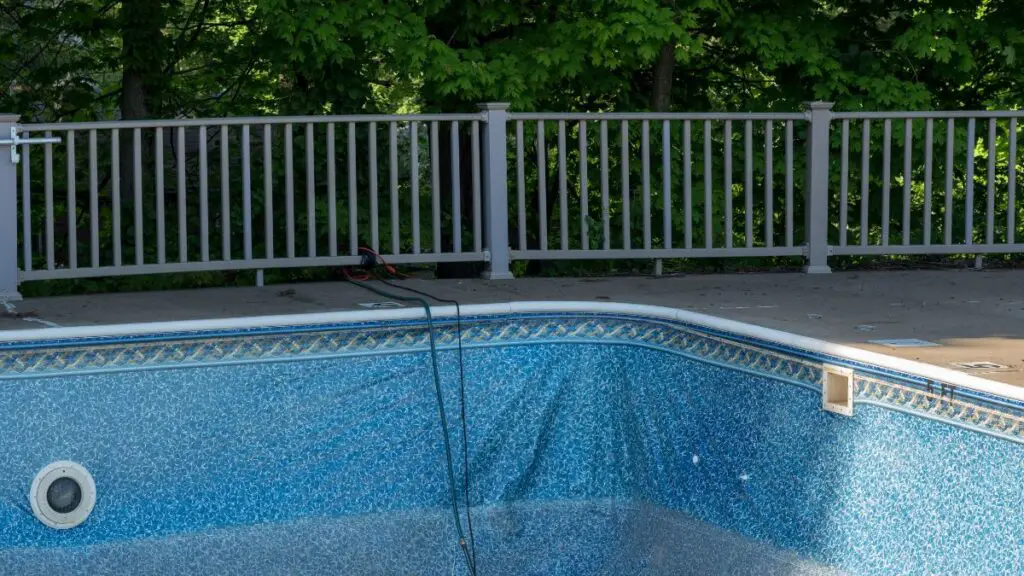
Signs That Your Pool Liner Needs Replacement
Just like any other component of your pool, your pool liner won’t last forever. Over time, it may show wear and tear signs indicating it’s time for a replacement. But how can you tell when to replace your pool liner? Here are some signs to look out for:
Physical Damage
Physical damage is one of the most obvious signs that your pool liner needs to be replaced. This can include cracks, tears, or holes in the liner. If you notice any of these signs, it’s important to address them promptly. Even small cracks or holes can lead to significant water loss and potentially damage the structure of your pool.
Sometimes, minor damage can be repaired with a pool liner patch. However, extensive or multiple areas of damage may require a full pool liner replacement.
Fading and Discoloration
Over time, your pool liner may begin to fade or discolor. This is often due to exposure to sunlight and pool chemicals, which can cause the liner’s color to bleach over time. While some fading is normal, significant or uneven fading can be a sign that the liner is weakening and may soon be prone to cracking or tearing.
In addition to affecting the appearance of your swimming pool, significant pool liner fading can also be a sign that the liner’s protective coating is wearing off. This coating helps protect the liner from damage and leaks, so it may be more susceptible to these issues if it’s wearing off.
Leaks
Leaks are another sign that your pool liner may need to be replaced. If you notice that your pool’s water level is consistently dropping faster than what can be attributed to evaporation or splash-out, you may have a water leakage.
Finding a leak in a pool liner can be challenging, as the source of the leak isn’t always obvious. You may need to thoroughly inspect the liner, looking for wet spots around the pool, soggy areas in the yard, or areas where the liner is pulling away from the pool wall.
The Consequences of Neglecting Pool Liner Replacement
The pool liner serves as the sole waterproofing mechanism for a vinyl pool. It’s time for a replacement when it ceases to perform this function. If the liner fails to contain the pool water, issues arise.
However, this doesn’t mean you should wait until the pool can’t hold water to replace the liner. The liner’s primary role is water retention. Any deficiency, no matter how minor, that prevents it from holding water signals the need for replacement. Large rips or tears are obvious deficiencies, but even small punctures or holes that allow water to escape should be addressed.
Many pool owners resort to temporary fixes like duct tape when the pool liner pops out of the coping track, particularly in the corners of rectangular pools. If the coping isn’t staying on track, it’s a sign that either the liner or the coping has reached its lifespan and needs replacement.
You might consider taping the corners as a temporary solution until you can afford a new liner, which can lead to further pool damage. A perfect liner doesn’t allow any water to escape.
Any deficiency, such as a rip, puncture, or corner that won’t stay in the coping track, can cause additional problems. If the liner has a single hole, you can patch it and continue using it. However, multiple holes or larger rips or tears immediately indicate the need for a new liner.
Wall Damage
A leak in a vinyl liner pool can lead to water seeping between the liner and the pool walls. This traps chlorinated water against the galvanized steel walls, causing rust to form quickly.
While the steel wall panels are designed for direct burial in the ground, chlorinated water accelerates rust formation compared to regular ground moisture.
If the chlorinated water escapes the pool structure, it can cause external components like the steel walls to form a galvanic couple with other metals in or around your pool, leading to rapid corrosion.
Floor Damage
Water traveling through the ground can cause erosion. Operating your pool with an active leak in the liner can weaken the pool’s concrete floor. Over time, this can cause the smooth concrete bottom to become sandy and weak and develop cracks.
If left unattended, the damage could be so severe that a new smooth bottom must be installed before the new liner, potentially doubling the liner replacement cost.
Deck Damage
Water escaping your pool system can also damage the surrounding deck. As water passes through the ground, it dissolves and washes away dirt, causing paving stone decks to sink over time and concrete decks to undermine, eventually leading to sinking or cracking.
Like car brakes, neglecting a pool liner for too long can damage other, more expensive pool components. Even a single season of operating the pool with a deficient liner can lead to extensive repairs that could have been avoided.
Timely repairs are crucial for your pool, but the liner’s waterproofing layer might be the most important part to repair quickly when it fails.
How to Extend the Lifespan of Your Pool Liner
While pool liners naturally wear out over time, there are steps you can take to extend their lifespan. By taking good care of your pool liner, you can ensure it lasts as long as possible, saving you money and keeping your pool looking its best. Here’s how:
Proper Installation
The first step to ensuring a long lifespan for your pool liner is the proper installation process. A poorly installed liner can lead to problems down the line, including wrinkles, leaks, and premature wear and tear.
When installing a pool liner, it’s important to ensure the pool surface is smooth and debris-free. The liner should be carefully positioned and secured to prevent wrinkles or stretching. If you’re not confident in your ability to install the liner yourself, consider hiring a professional. They have the experience and knowledge to ensure the liner is installed correctly, which can help extend its lifespan.
Regular Maintenance
Regular maintenance is key to extending the lifespan of your pool liner. This includes keeping your pool clean, monitoring for signs of damage, and addressing any issues promptly.
Here are some maintenance tips to help extend the lifespan of your pool liner:
- Clean your pool regularly: Use a pool vacuum or skimmer to remove debris from the pool. This can prevent damage to the liner and keep your pool looking its best.
- Monitor for damage: Regularly inspect your pool liner for signs of damage, such as cracks, tears, or leaks. If you notice any issues, address them promptly to prevent further damage.
- Avoid sharp objects: Sharp objects can damage your pool liner. Encourage pool users to avoid bringing sharp objects into the pool and be careful when cleaning or maintaining the pool.
- Use a pool cover: A pool cover can protect your liner from damage caused by sunlight, debris, and harsh weather conditions.
Balanced Water Chemistry
Maintaining balanced water chemistry is crucial for extending the lifespan of your pool liner. Unbalanced water can lead to common issues like algae growth, liner fading, and even damage to the liner material.
Here are some tips for maintaining balanced water chemistry:
- Test your water regularly: Use a pool testing kit to monitor the levels of chlorine, pH, alkalinity, and other chemicals in your pool. This can help you identify any imbalances and address them promptly.
- Adjust chemicals as needed: If your water testing reveals any imbalances, adjust your pool chemicals. Follow the manufacturer’s instructions for adding chemicals to your pool.
- Consider a pool professional: If you’re unsure how to balance your pool’s water chemistry, consider hiring a pool professional. They can test your water and adjust your chemicals as needed, helping to protect your pool liner.
Frequently Asked Questions About How Long Does Pool Liner Last
How do I know if my pool liner is bad?
Identifying a bad pool liner involves looking for signs of physical damage, fading, discoloration, or potential leaks. Physical damage can include cracks, tears, or holes in the liner. Significant or uneven fading can indicate that the liner’s protective coating is wearing off. You may leak if your pool’s water level is consistently dropping faster than what can be attributed to evaporation or splash-out.
How do I know when to replace my vinyl pool liner?
Knowing when to replace your vinyl pool liner involves monitoring for signs of wear and tear. This can include physical damage, significant fading or discoloration, or leaks. If you notice any of these signs, it may be time to replace your liner. The average lifespan of a vinyl pool liner is around 6-12 years, but this can vary based on factors like maintenance and usage.
Why is my pool liner fading after 2 years?
Fading can occur in the pool liner due to exposure to sunlight and pool chemicals. If your pool liner is fading after 2 years, it could be due to excessive sunlight exposure, unbalanced water chemistry, or harsh chemicals. Regular maintenance and proper water balance can help prevent premature fading.
How long do pool liners last in above ground pools?
The lifespan of an above-ground pool liner can vary based on several factors, including the quality of the liner, pool usage, and maintenance. On average, above-ground pool liners tend to last between 6 to 10 years. However, with proper care and maintenance, they can sometimes last longer.



